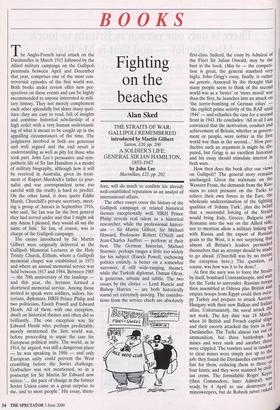BOOKS
Fighting on the beaches
Alan Sked
The Anglo-French naval attack on the Dardanelles in March 1915 followed by the Allied military campaign on the Gallipoli peninsula between April and December that year, comprises one of the most con- troversial episodes of the first world war. Both books under review offer new per- spectives on these events and can be highly recommended to anyone interested in mili- tary history. They not merely complement each other splendidly but share many qual- ities: they are easy to read, full of insights and combine historical scholarship of a high order with a very human understand- ing of what it meant to be caught up in the appalling circumstances of the time. The judgments involved in both are generous and well argued and the end result is understanding as well as pity for those who took part. John Lee's persuasive and sym- pathetic life of Sir Ian Hamilton is a model of military biography, although how it will be received in Australia, given its treat- ment of Rupert Murdoch's father (a jour- nalist and war correspondent none too careful with the truth) is hard to predict. On the other hand, it does quote Eddie Marsh, Churchill's private secretary, meet- ing a group of Anzacs in September 1916, who said, 'Sir Ian was far the best general they had served under and that I might ask any Anzac I pleased, they would all say the same of him.' Sir Ian, of course, was in charge of the Gallipoli campaign.
The essays introduced by Sir Martin Gilbert were originally delivered as the Gallipoli Memorial Lectures at the Holy Trinity Church, Eltham, where a Gallipoli memorial chapel was established in 1971 and where an annual memorial service was held between 1917 and 1984. Between 1985 — the 70th anniversary of the landings — and this year, the lectures formed a shortened memorial service. Among those invited to speak were soldiers, sailors, his- torians, diplomats, HRH Prince Philip and two politicians, Enoch Powell and Edward Heath. All of them, with one exception, dwelt on historical themes and often did so brilliantly. The one exception was • Sir Edward Heath who, perhaps predictably, merely mentioned the first world war, before proceeding to argue the case for European political unity. The world, as in 1914, he argued, was still a dangerous place — he was speaking in 1986 — and only European unity could prevent the West crumbling before the Soviet challenge. Gorbachev was not mentioned, so in a postscript for Sir Martin Sir Edward now writes: '... the pace of change in the former Soviet Union came as a great surprise to me, and to most people.' His essay, there- fore, will do much to confirm his already well-established reputation as an analyst of international affairs.
The other essays cover the history of the Gallipoli campaign or related historical themes exceptionally well. HRH Prince Philip reveals real talent as a historical researcher, while the professional histori- ans — Sir Martin Gilbert, Sir Michael Howard, Professors Robert O'Neill and Jean-Charles Jauffret — perform at their best. The German historian, Michael Sturmer, perhaps ranges a little too widely for his subject (Enoch Powell, eschewing politics entirely, is better on a somewhat narrower, if still wide-ranging, theme), while the Turkish diplomat, Osman Olcay, is generous, urbane and subtle. The two essays by the clerics — Lord Runcie and Bishop Harries — are both historically sound yet extremely moving. The contribu- tions from the service chiefs are absolutely first-class. Indeed, the essay by Admiral of the Fleet Sir Julian Oswald, may be the best in the book. (May be — the competi- tion is great, the general standard very high). John Grigg's essay, finally, is rather sui generis. Annoyed by the thought that many people seem to think of the second world war as a 'better' or 'more moral' war than the first, he launches into an attack on `the terror-bombing of German cities' 'the explicit prime activity of the RAF until 1944' — and rehashes the case for a second front in 1943. He concludes: 'All in all I am convinced that the motivation, conduct and achievement of Britain, whether as govern- ment or people, were nobler in the first world war than in the second...' How pro- ductive such an argument is might be dis- puted, but Grigg is an excellent historian and his essay should stimulate interest in both wars.
How then does the book alter our views on Gallipoli? The general story remains unchanged. Given the stalemate on the Western Front, the demands from the Rus- sians to exert pressure on the Turks to relieve their own forces in the East, the wholesale underestimation of the fighting qualities of 'Johnny Turk', plus the belief that a successful forcing of the Straits would bring Italy, Greece, Bulgaria and Romania into the war on the Allied side, not to mention allow a military linking uP with Russia and the export of Russian grain to the West, it is not surprising that almost all Britain's leaders persuaded themselves that an attempt should be made to go ahead. (Churchill was by no means the exception here.) The question, of course, was how was it to be done? At first the navy was to force the Straits . by itself, bombard Constantinople, and wait for the Turks to surrender. Russian troops then assembled at Odessa plus British and empire troops from Egypt could then occu- py Turkey and prepare to attack Austria- Hungary with their new Balkan and Italian allies. Unfortunately, the naval attack did not work. The key date was 18 March, when 16 British and French capital ships and their escorts attacked the forts in rile, Dardanelles. The Turks almost ran out of ammunition, but three battleships hit mines and were sunk and another three were crippled. The trawlers used in tandem to clear mines were simply not up to the job: they found the Dardanelles current too fast for them, reducing them to three. or _ four knots; and they were manned by cows ian crews. The formidable Roger Keyes (then Commodore, later Admiral) V13s ready by 4 April to use destroyers 35 minesweepers, but de Robeck never risked another naval assault and on 22 March the campaign was left to the army. The man in charge was Sir Ian Hamilton, a forward-looking and experienced com- mander, whom Lord Roberts considered its finest officer in the army, and who had twice been considered for the VC. (He was first judged too young and then too old, first too junior and then too senior. Per- haps Napoleon would have rejected him for the post in 1915 as lacking the luck required of a senior commander. Certainly, Gallipoli would provide him with none.) His difficulties were immense: he had no command over the navy; he was let down consistently by Kitchener, who only sup- plied troops too late and in too few num- bers; he lacked maps, ammunition, planes of any kind, howitzers, modern landing craft and submarines; fundamentally he had an almost impossible job with troops expected to fight their way on to small crowded beaches under Turkish shelling and then climb steep cliffs to defeat a numerically superior and easily reinforced enemy, led by brilliant commanders in Atattirk and Liman von Sanders (or von Liman as Professor O'Neill insists on call- ing him). Amphibious warfare, after all, was in its infancy, nothing like this had ever been attempted before, and in London there was no unity of command or even consensus of opinion. In the middle of events, for example, the First Sea Lord, Admiral Fisher, changed his mind about the expedition. In the words of Julian Oswald: 'Cajoled by Churchill into the Dardanelles scheme, he gave lukewarm support, then got cold feet, resigned in a huff, hid in the Charing Cross Hotel and took flight to Scotland — a bizarre little story which would be quite funny...' Quite. The same author gives a part of his essay to a list of events under the heading 'Believe It or Not'.
Should the expedition ever have been attempted? In 1892 the naval chiefs had already warned the government that the Straits could not be forced. In 1915, to be fair, the Russians were on our side; still, the difficulties were immense. The Straits at their narrowest were only 1,600 yards across. It was very difficult to miss a ship at 800 yards, given there were forts on either side. Besides, there was a Catch 22 involved. To clear the mines, the forts had to be destroyed. To destroy the forts, the mines had to be removed. Yet if de Robeck had returned to the assault on 19 March, the Turks would have run out of ammuni- tion and might have panicked into surren- der. The mines might have been cleared. The Russians might even have arrived. Again, on one or two occasions it seemed that the troops might just have been able to defeat the Turks had more reinforcements been available or even more naval gunnery to bombard the Turks with greater accura- cy. Historians like Sir Michael Howard will have none of this, however, and see the whole episode as a disaster. Others won- der, even if it had been successful, whether Gallipoli really would have made a major contribution to ending the war or would merely have constituted a Balkan side- show. We shall never know.
In the end it was seen as a disaster. Hamilton never got another command dur- ing the war, although the Commission of Enquiry cleared him (and rightly so, if Lee's biography can be believed). Surpris- ingly, the campaign eventually cemented good relations with the Turks, whom all our soldiers praised for their fighting quali- ties and behaviour. Atatijrk returned the compliment, himself writing for the Garden of Remembrance on Gallipoli: Heroes that shed their blood and lost their lives . . . You are now lying in the soil of a friendly country. Therefore rest in peace. There is no difference between the Johnnies and Mehmets to us where they lie side by side here in this country of ours. You moth- ers, who sent your sons from far-away coun- tries, wipe away your tears; your sons arc now lying in our bosom and are in peace. After having lost their lives on this land, they have become our sons as well.
Churchill took infinite care to ensure that the next major amphibious expedition with which he was involved was properly planned. Indeed, Normandy's success may owe more than a little to the 50,000 Allied dead and 150,000 wounded on the beaches of Gallipoli.






































































 Previous page
Previous page